
 "Web" will make its world premiere at DOC NYC this Saturday at the IFC Center. Four years in the making, "Web" is a firsthand look at the effects of the One Laptop per Child program on the citizens of underdeveloped areas of Peru. The goal of One Laptop per Child is to bring as much connectivity as possible to everybody in the world, regardless of living conditions. By providing affordable laptops to students of these areas, they hope to make these remote areas feel like they are part of the expanding, connected world. While those receiving laptops can now feel linked to the world, the world would still be unlinked to them, were it not for director Michael Kleiman. Kleiman continues the trend of connectivity by bringing us face to face with those being helped.
"Web" will make its world premiere at DOC NYC this Saturday at the IFC Center. Four years in the making, "Web" is a firsthand look at the effects of the One Laptop per Child program on the citizens of underdeveloped areas of Peru. The goal of One Laptop per Child is to bring as much connectivity as possible to everybody in the world, regardless of living conditions. By providing affordable laptops to students of these areas, they hope to make these remote areas feel like they are part of the expanding, connected world. While those receiving laptops can now feel linked to the world, the world would still be unlinked to them, were it not for director Michael Kleiman. Kleiman continues the trend of connectivity by bringing us face to face with those being helped.
SB: How hard was it for you to get used to staying in Peru? What was the longest stretch of time you spent there at once? What American amenities did you miss most?
MK: I lived in Peru for 11 months straight. Of that time, I spent about 3 months in Palestina (the Amazon), 3 months in Antuyo (the Andes), 3 months in Lima and 2 months or so traveling around the country. I had a home base in Lima and would go to one of the communities for a month, come back to Lima for a month to regroup and plan, and then go to the other community for a month. I fell in love with Peru very quickly, so it wasn’t too hard to get used to living down there. The people are incredibly warm and welcoming, there’s a great amount of culture, and it’s a beautiful place. Living in the communities, especially in the Amazon, was a little tougher to get used to. In the Amazon I slept in a tent in an unused school house, bathed from a well, and ate all of my meals with one of the families that’s featured in the film. Not to mention the heat and bugs that are constant facts of life down there. So more than missing any particular American amenities, the bigger relief was returning to Lima after a month in the jungle and having access to basic luxuries like electricity and running water. Though I do remember getting my first slice of NY pizza after 11 months in Peru and feeling pretty happy about it.
SB: Have you been back to the Purus region since concluding the film? If not, would you like to go back?
MK: Yes! With some support from the U.S. Embassy in Lima, I just made a trip back to Peru in August. I spent three weeks in Peru which was enough time to make it to both communities – Antuyo in the Andes and Palestina in the Purus region of the Amazon. I was thrilled to have the opportunity to show the film to the community members who I think of as my collaborators more than anything. They got a kick out of seeing themselves on screen and more than anything were excited about the idea of people around the world getting a glimpse into their lives. I learned that one of the families in Antuyo, whose two boys Bernardo and Roy are featured in the film, named a new grandchild Michael after me. That was obviously very touching. Overall it was a great experience to see that the time I spent there was still meaningful to all of us and be able to watch the film together and feel proud of what we’d accomplished.
SB: Did any of the Peruvians you meet dislike the laptops/internet that were being brought to them for any reason?
MK: I was surprised by how universally desired and welcomed the program was. Prior to arriving in Peru, I was expecting to see some more push back from parents who felt that the technology was infringing on their culture or who didn’t recognize the educational benefit of the laptops. That really wasn’t the case. In the two villages where I was, the parents (and the children) were well aware that this sort of technology is out there and they wanted access to it themselves. Certainly, as the film shows, there were people who felt there were other things the villages needed first – i.e. roads or electricity – but they all welcomed the laptops.
SB: How is One Laptop per Child measuring their success? How do they know what they're doing is working?
MK: I’m not sure exactly what OLPC has been doing internally to measure their success. I know there are a lot more laptops out there in the world today then there were just a few years ago. I do know of a few independent studies that have looked at improvements in reading ability, time spent in school and math skills after participation in the program and have turned up some pretty mixed results. One thing about all the independent studies that I find interesting is that they all show that children who participated in the OLPC program have far greater access to computers than children who don’t. That seems somewhat obvious, but it’s really important. Especially if, like me, you think that having a degree of computer literacy is going to be important in succeeding in a connected world. Having access to your own personal computer at a young age is critical to preparing kids in isolated communities for success in a digital world.
 SB: Do you personally feel that the countless social media sites the internet holds are connecting us all, or separating us even further apart?
SB: Do you personally feel that the countless social media sites the internet holds are connecting us all, or separating us even further apart?
MK: I think like most things in life, it’s about balance. Seeing people connect to the Internet for the first time can be eye-opening in that it reminds you how powerful some of these tools can be. I had expected that when they were connected for the first time, the kids and their families would be blown away by the sheer amount of information that was suddenly at their fingertips. What was far more exciting to them was the people they could connect to. Families who hadn’t seen loved ones for years could suddenly speak to them through messaging tools and send them photographs through email. It was really amazing to watch that. So the ability to keep in touch with people on the other side of the world is an amazing thing that’s easy to take fore granted. As an example, I stay in touch with the people in Palestina through Facebook. Those are relationships that are very important to me and suddenly I have a way of perpetuating them and keeping up to date on their lives. But I’ll be the first to admit, I also have a hard time carrying out long one-on-one conversations without glancing at my iPhone. So overall, I do think these tools are connecting us in ways that weren’t possible just a few years ago. But we need to balance that with making sure that we’re also present for one another in the physical world.
SB: How difficult was this project to execute?
MK: It was certainly a challenge. First of all, it was very long production, about four years total. Like any long production process, there were some hiccups in the road. What made it difficult with this film was the isolation of the locations. In order to get to Palestina (the village in the Amazon), my crew and I had to take Peruvian air force cargo flights that only left from Lima every 15 days. One of our shoots was delayed for a month because the air force diverted its planes to help with aid missions in the aftermath of the 2010 earthquake in Chile. And then of course, once we got to the village we were left to our own devices in solving any technical issues that came up. Fortunately, I had great support from a wonderful team in Peru that was amazingly resourceful.
On the interview side, we were operating with a subject matter that was constantly changing. We had opportunities to interview some really incredible people like Wikipedia Co-Founder, Jimmy Wales; Foursquare Founder, Dennis Crowley; and “father of the Internet,” Vint Cerf. As we were preparing for the interviews, it seemed like every week a new story would break that was incredibly relevant, whether it was the Arab Spring, or Wikileaks. Obviously just because we finished conducting our interviews, the world didn’t stop changing. So keeping the film current through such a long production process was definitely a challenge, but one I think we managed very successfully.
“Web” makes its world premiere at DOC NYC on Sat. Nov 16 @ 2 PM at the IFC Center. An encore presentation will take place Tues. Nov 19 @ 5 PM. Director Michael Kleiman is expected to attend. You can read our review for "Web" here.